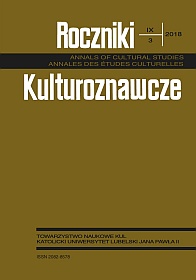Reception of the Socrates Character in Selected Works of Literature and in “Colombo” Crime Series
Abstract
The article refers to the figure of Socrates and its contemporary reception as a cultural phenomenon. The author recalls works in which Philosopher appears—in poetry, drama, prose, in radio dramas and in the American television series “Columbo.” Every time different aspect of the character is accented. Socrates as a multidimensional figure is invoked in various ways—its inconspicuous appearance, brilliant humor, and sharp language are accented, another time the search by him for the truth, and finally his conviction, his death and post-mortem rehabilitation, described by Diogenes Laertios, which, although not confirmed from another source, is information sufficiently strong that resist in the minds of recipients. The author tries to show how Socrates is presented in the context of creators its times. Undoubtedly, both the author and the times influence the perception of the philosopher. And so are the subsequent reflections of this character — tragic, coarse, penetrating.
References
Ebert, Roger. „Diabolique”. Sun Times reviews. February 17, 1995. Retrieved June 27, 2011. Dostęp 3.04.2018. https://www.rogerebert.com/reviews/diabolique-1995.
Junkiert, Maciej. „O Norwidowskim Sokratesie”. Studia Norwidiana 31 (2013): 183–191.
Łygas, Helena. „Mężczyźni za nią szaleli, kobiety zazdrościły stylu. Nawet ci, którzy nie czytują poezji, znają twórczość Poświatowskiej”. Serwis natemat.pl, 14 stycznia 2017. Dostęp 1.01.2018. http://bliss.natemat.pl/199151,halina-poswiatowska-poetka-w-ktorej-zakochuja-sie-mimo-uplywu-lat-nawet-osoby-nieznoszace-poezji.
Mróz, Tomasz. „Radiowa adaptacja Platońskich dialogów w przekładzie W. Witwickiego i jej recepcja na seminarium filozoficznym H. Jakubanisa w KUL”. Roczniki Filozoficzne 61 (2013), nr 1: 43–71.
Mróz, Tomasz. „Uczta w przekładzie W. Witwickiego jako punkt zwrotny w polskiej recepcji dialogów Platona”. Lectiones & Acroases Philosophicae 7 (2014), z. 2: 129–150.
Philosophy Now: A Magazine of Ideas. Issue 64: November/December 2007. Dostęp 3.04.2018. https://philosophynow.org/issues/64/Just_One_More_Thing.
Siwiec, Marek Kazimierz. „Zbigniew Herbert – ku tajemnicy Sokratesa”, Filo-Sofija 10 (2010/2), nr 11: 7–28.
The Oxford Companion to Crime and Mystery Writing, edited by Rosemary Herbert. Published online: 2005. Oxford Reference. Dostęp 3.04.2018. http://www.oxfordreference.com/view/10.1093/acref/9780195072396.001.0001/acref-9780195072396-e-0344?rskey=Z4EsOA&result=346. DOI: 10.1093/acref/9780195072396.001.0001.
Wallis, Mieczysław. „Wspomnienia i uwagi o Władysławie Witwickim”. Ruch Filozoficzny 33 (1975), nr 1: 15–22.
Weinberger, David. „Socrates in a Raincoat0. TV Guide, 8.06.1974. Informacja na stronie autora felietonu: http://www.hyperorg.com/blogger/2016/08/31/socrates-in-a-raincoat/. Dostęp 6.04. 2018.
Werner, Wiktor. Prelekcja pt. „Sokrates oskarżony. Tożsamość nauki między sacrum a profanum. (Dwie księgi)”. Copernicus Center for Interdisciplinary Studies. Copernicus Festival. Opublikowany 17.01.2016. Dostęp 11-03-2016. https://www.youtube.com/watch?v=30n_k_keJE8.





